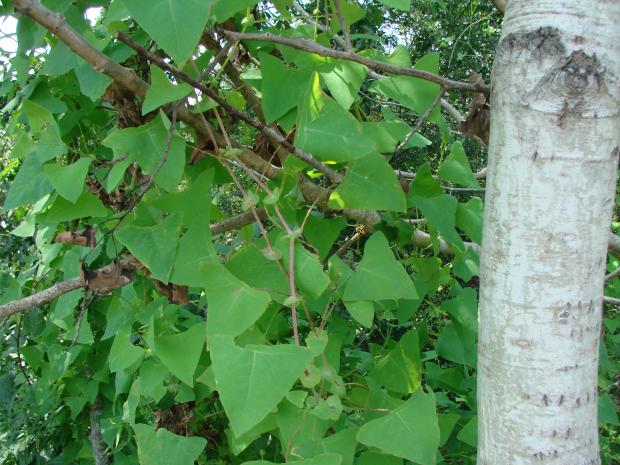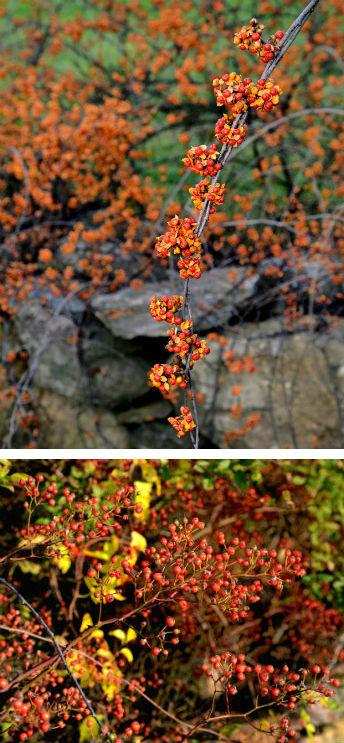Invasive species are one of the greatest threats to the integrity of natural communities and also a direct threat to the survival of many indigenous species. As a result, we engage in efforts to identify the most problematic species and to manage them when and where it is possible.
Invasive plants in Massachusetts
Of the 2263 plant species in Massachusetts that have been documented as native or naturalized (established newcomers introduced directly or indirectly by man), about 725 (32%) are naturalized. Of these, the Massachusetts Invasive Plant Advisory Group (MIPAG), a committee where NHESP is represented, recognized 72 species as "Invasive," "Likely Invasive," or "Potentially Invasive."
Click here to view a list of invasive plants.
Once plant species are recognized as invasive, likely invasive or potentially invasive by “MIPAG”, the Massachusetts Department of Agricultural Resources holds a hearing to determine if species newly listed by MIPAG should be added to the list of noxious weeds regulated with prohibitions on importation, propagation, purchase and sale in the Commonwealth. Also, the Massachusetts Association of Conservation Commissions (MACC) now encourages Commissioners to consider the wetland impacts of these invasive species during project reviews as part of their jurisdiction under the Wetland Protection Act.
Additional Resources
- Massachusetts Invasive Plant Advisory Group
-
Open PDF file, 441.11 KB, The Invasive Plant Problem (English, PDF 441.11 KB)
-
Open PDF file, 25.45 KB, Environmental Impacts and Economic Costs of Invasive Species (English, PDF 25.45 KB)
-
Open PDF file, 33.2 KB, Invasive Species Research (English, PDF 33.2 KB)
Identifying and managing invasives
Many good references exist in libraries, book stores, and on line to help with making accurate plant identifications.
In 2004, MIPAG completed a report offering recommendations for managing invasive plants in Massachusetts Strategic Recommendations for Managing Invasive Plants in Massachusetts. All state agencies within EEA are contributing in some way to this effort. It is important that management strategies be well researched and planned; otherwise scarce funds and human resources could be wasted. Information on the biology of invasive species and their management is increasing dramatically and much can be found on the web. New scientific journals have arisen that deal specifically with invasive species research.
- Identify and control or eradicate invasive plant species where possible, starting with one's own property or local conservation areas where control projects are underway or being planned. Volunteer with the Native Plant Trust to help with their invasive plant monitoring and control projects.
- Report any sightings to EDDMapS or to iNaturalist. Both of these on-line resources have phone apps as well, and both are checked by state employees concerned with invasive species. It is important to include numbers observed and area impacted in your report.
- Educate others and report anyone illegally selling, growing, or distributing invasive plants.
- Plant only native plant species or non-native species that have been researched and proven to be non-aggressive in terms of naturalizing into natural areas or minimally managed habitats in Massachusetts or New England.
Additional Resources
Avoid decorating with invasive plants
During holiday seasons, many people use plants to decorate their homes or businesses. We highly recommend that people avoid using certain exotic, invasive plants such as Oriental bittersweet (Celastrus orbiculatus) and Multiflora rose (Rosa multiflora) in holiday decorations. Though these plants are attractive, it is best to refrain from using them. Birds eat and carry away the fruits from wreaths and garlands and the digested but still-viable seeds sprout where deposited.
Exotic, invasive plants create severe environmental damage, invading open fields, forests, wetlands, meadows, and backyards, and crowding out native plants. Bittersweet can even kill mature trees through strangling. Both plants are extremely difficult to control: when cut off, the remaining plant segment in the ground will re-sprout. It is illegal to import or sell bittersweet and multiflora rose in any form (plants or cuttings) in Massachusetts.
Contact
Online
Phone
Open M–F, 8 a.m.–4 p.m. (closed noon–12:30 for lunch)
North/Central/Western Massachusetts
Southeastern Massachusetts/Cape & Islands

